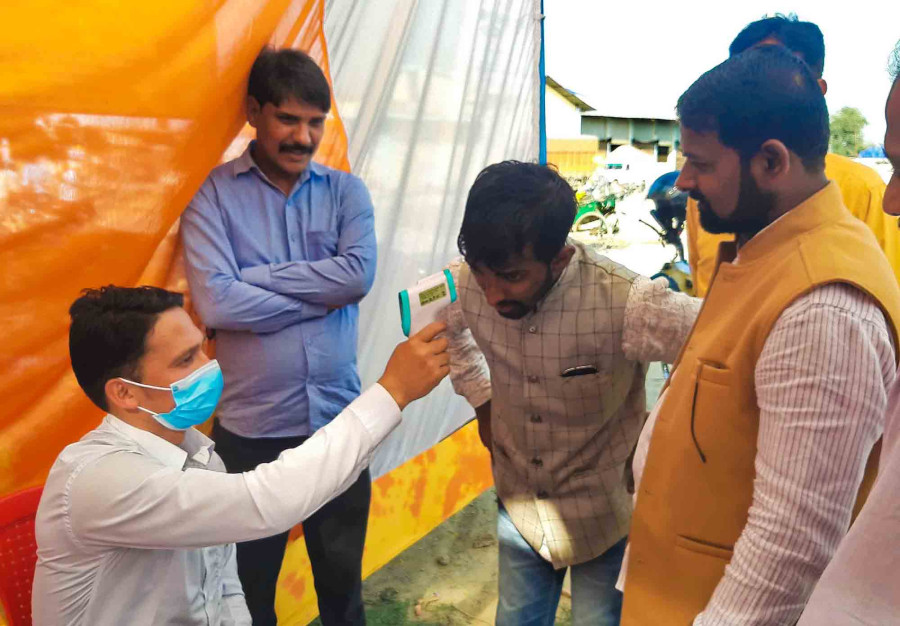Health
For health workers on the front lines, no training and no protective gear
As health workers are more at risk of exposure to the virus, it is necessary to ensure that they are trained and have proper gear, or they might quit.
Arjun Poudel
On Sunday night, doctors and nurses at the Green City Hospital in Basundhara were in an uproar. A man in his late 40s had just arrived complaining of diarrhoea but he said he had just visited the Sukraraj Tropical and Infectious Disease Hospital for a fever, suspecting he might’ve contracted Covid-19.
Upon hearing his account and given the symptoms he presented—fever and diarrhoea, —health workers began to panic.
“We were afraid of possible transmission,” a nurse at the hospital told the Post on condition of anonymity. “Some nursing staff even started crying.”
Ultimately the man was discharged.
A similar scene unfolded at the Tribhuvan University Teaching Hospital on Tuesday, when a 58-year-old woman from Shantinagar came in with fever, cough and chest pain. The woman, who had returned to Nepal 13 days ago from the United States, had caused mass panic at the hospital’s emergency ward. She was ultimately dispatched to the Teku hospital.
As fears continue to grow over the Covid-19 outbreak, more patients are visiting hospitals to get themselves checked out. But the doctors, nurses, paramedics and other health workers who deal with them lack proper protective gear to treat patients who might potentially be carrying the disease. Without proper face masks and body covering, health workers are at risk of contracting the disease themselves, and especially for those who have elderly parents and small children at home, this is a risk they might not be willing to take.
After Wednesday’s incident, doctors and nurses at the Teaching Hospital emergency ward have already threatened to stop coming to work if they are not adequately protected against Covid-19.
Health workers at both state-run and private hospitals say that they don’t just lack protective gear but haven’t been trained on how to properly deal with an infectious disease like Covid-19.
"The government has neither provided us with any training nor any safety gear,” Manish Dawadi, hospital manager at Green City, told the Post. “We’ve been sewing our own cloth masks to use in the hospital.”
As of March 19, more than 225,000 Covid-19 infections were reported in 176 countries and territories, with more than 9,200 deaths. While the Sars-nCov-2 coronavirus that causes Covid-19 is highly pathogenic, the disease itself is not often fatal for those who are young and healthy. The mortality rate is currently estimated to be 1 percent or lower, revised from an initial 3.4 percent. The elderly, those with chronic conditions and the immunocompromised are most at risk. Health workers on the front lines, however, shoulder a much greater risk of infection.
Many health workers at private hospitals, who are generally grossly underpaid, may not be willing to take that risk, say public health experts.
“How can the government ask nurses, who are paid Rs 8,000 to Rs 10,000 a month, to treat patients who might have Covid-19?” Dr Subhash Prasad Acharya, chief of the critical care department at TU Teaching Hospital, said. "It would be disastrous to compel them to attend to such patients without providing them with safety training and equipment."
According to Dr Baburam Marasini, a former director of the Epidemiology and Disease Control Division, past experience dealing with highly infectious diseases has made health workers wary, especially the 2014 Ebola outbreak in Africa.
“Our health workers may quit at times of emergency if we do not motivate them and provide them with the necessary safety measures,” said Marasini.
By August 2014, more than 240 health workers in Guinea, Liberia, Nigeria, and Sierra Leone had been infected with Ebola and more than 120 had died, leading several doctors, nurses and health workers to quit services.
The World Health Organization had attributed the infections to “shortages of personal protective equipment or its improper use, far too few medical staff for such a large outbreak, and the compassion that causes medical staff to work in isolation wards far beyond the number of hours recommended as safe.”
But Mahendra Prasad Shrestha, director-general at the Department of Health Services, said that health workers do not need special training as they learn what is necessary while studying to become nurses and doctors.
“It is impossible to impart training to all health workers whenever new diseases emerge,” Shrestha told the Post. “We will only provide safety training to those involved in critical care.”
While Covid-19 might not be as dangerous as Ebola, it presents a significant risk to compromised populations, and in Nepali society, where many adults still live with their parents, there is a possibility that infected health workers could pass the virus onto the old and infirm.
The Nepal Medical Council, on Thursday, asked hospitals with over 100 beds to begin operating separate fever clinics and provide services wearing personal protective equipment. Issuing a press release, the national regulatory body of medical doctors also asked elective surgeries be postponed to conserve resources an outbreak, ensure the protection of health workers, and lessen unnecessary crowds at hospitals and treatment centres.
The council also urged the general public to not to go to the hospital unless they have an emergency and treat minor colds and coughs at home, postpone minor surgeries, and avoid crowds.




 16.12°C Kathmandu
16.12°C Kathmandu















